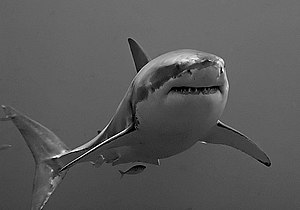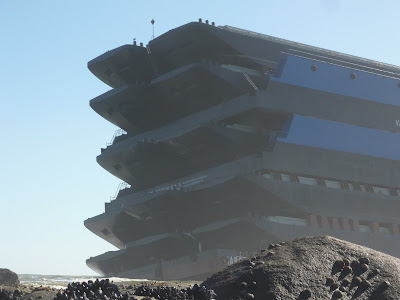 Image via Wikipedia
Image via Wikipedia
Great white sharks 'akin to serial killers'
Seth Borenstein
WASHINGTON: Great white sharks have some things in common with human serial killers, a study in Cape Town's False Bay has found: they don't attack at random, but stalk specific victims, lurking out of sight.
The sharks hang back and observe from a base that is not too close, not too far, hunt strategically, and learn from previous attempts, according to a study being published online today in the Journal of Zoology.
Researchers used a serial killer profiling method to figure out just how the fearsome ocean predator hunts, something that has been hard to observe under water.
"There's some strategy going on," said co-author Neil Hammerschlag, a shark researcher at the University of Miami. "It's more than sharks lurking at the water waiting to go after them."
Hammerschlag worked with researchers from UCT and other universities in initital research, and observed 340 great white shark attacks off Seal Island in False Bay.
The sharks feeding at Seal Island could simply have hovered where the seals congregated if they were random killers of opportunity, Hammerschlag said. But they weren't.
The sharks had a distinct mode of operation. They were focused. They stalked from a usual base of operations, 90 metres from their victims - close enough to see their prey, but not close enough to be seen and scare off their victims.
They attacked when the light was low. They liked their victims young and alone. They tried to attack when no other sharks were around to compete. They learnt from previous kills. And they attacked from below, unseen.
There's a big difference between great white sharks and serial killers and it comes down to motive. The great whites attack to eat and survive, not for thrills.
And great whites are majestic creatures that should be saved, Hammerschlag says.
"They both have the same objective, which is to find a target or prey or victim," said study co-author D Kim Rossmo, a professor of criminal justice at Texas State University-San Marcos. "They have to lurk. They want to be efficient in their search."
The human criminal has to worry about being caught by police and thus is even more careful, said Rossmo, who was a police officer for more than 21 years in Vancouver, Canada.
R Aidan Martin, a Canadian shark researcher who has since died, was reading a mystery that detailed the fairly new field of geographic profiling, which tries to find criminals by looking for patterns in where they strike.
He connected with Rossmo, a pioneer in that criminal field, and they applied the work of tracking down criminals to shark strategy.
Martin and Hammerschlag watched sharks from sunrise to sunset, applied the "fancy maths" of geographic profiling and came out with plots that showed there was some real stalking going on, Hammerschlag said.
Older sharks did better and were more stealthy than younger, smaller sharks, demonstrating that learning was occurring, he said.
The study focused on just one location, but the same principles are likely to be applied to other shark hunting grounds.
They can't really apply to shark attacks on people because those are so infrequent, Hammerschlag said. But if you could figure out the base of operations for the great whites, it would give you a good idea of places to avoid if you were worried about attacks.
Other animals, such as lions, also reveal strategies in their hunting, Hammerschlag said. Land animals have been observed more easily from the air or elsewhere on the ground.
Cape Times 22 June 2009 2nd Edition

 The great news is that the sun has been shining for three glorious days. The storm has washed away all the smog that was hanging over the city and left us with some breathtaking views. Cape Town is sparkling!!
The great news is that the sun has been shining for three glorious days. The storm has washed away all the smog that was hanging over the city and left us with some breathtaking views. Cape Town is sparkling!!


![Reblog this post [with Zemanta]](http://img.zemanta.com/reblog_e.png?x-id=d5e38522-b569-4f94-8ca4-84946b1b839f)







